Airport City review – Help your city take flight on Windows Phone and Windows 8
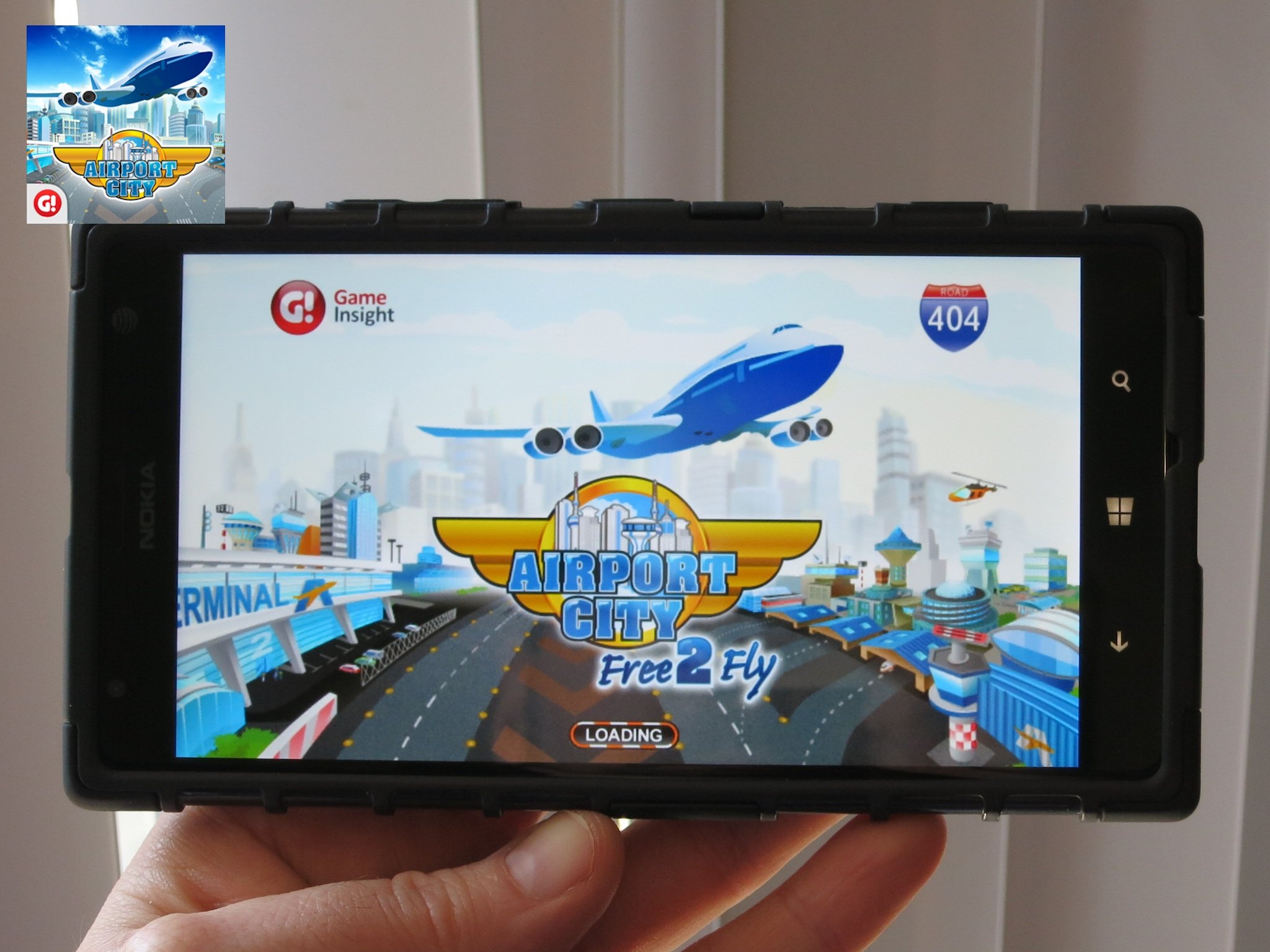
Russian publisher Game Insight produces titles in many genres (mostly on other platforms), but its specialty is city-building games. Their previous Windows Phone and Windows 8 release 2020: My Country impressed me with its futuristic setting and wealth of content (see our review). But still, I longed to see more Game Insight titles make their way to mobile Windows platforms.
As luck would have it, Game Insight has just released Airport City on both Windows Phone (1 GB of RAM or higher at present) and Windows 8 and RT. It comes from Innowate, the same team who bought us the My Country series. Although the two game look and play a lot alike, Airport City does a few things differently as well. Namely it combines traditional city building with airport management, which proves more interesting than you might expect.
Airports made easy

New players will start Airport City with a tiny village, a fledgling airport, and a dream: to build an international airport. A well-drawn stewardess and several other airport employee characters will guide you through the process of building both airport and town, as well as earning money by sending planes out into the world.
The first step towards a thriving airport is of course building a runway. Won’t be landing too many planes without that! After buying one from the game’s building and item store and placing it, you’ll then want to purchase a hangar. From there you can invest in a plane, at which point your airport truly becomes operational.
Once you can start managing flights, the game really picks up. Select the hangar and choose a flight from the available list. Players only start with one destination available, but more will unlock as they reach new experience levels.
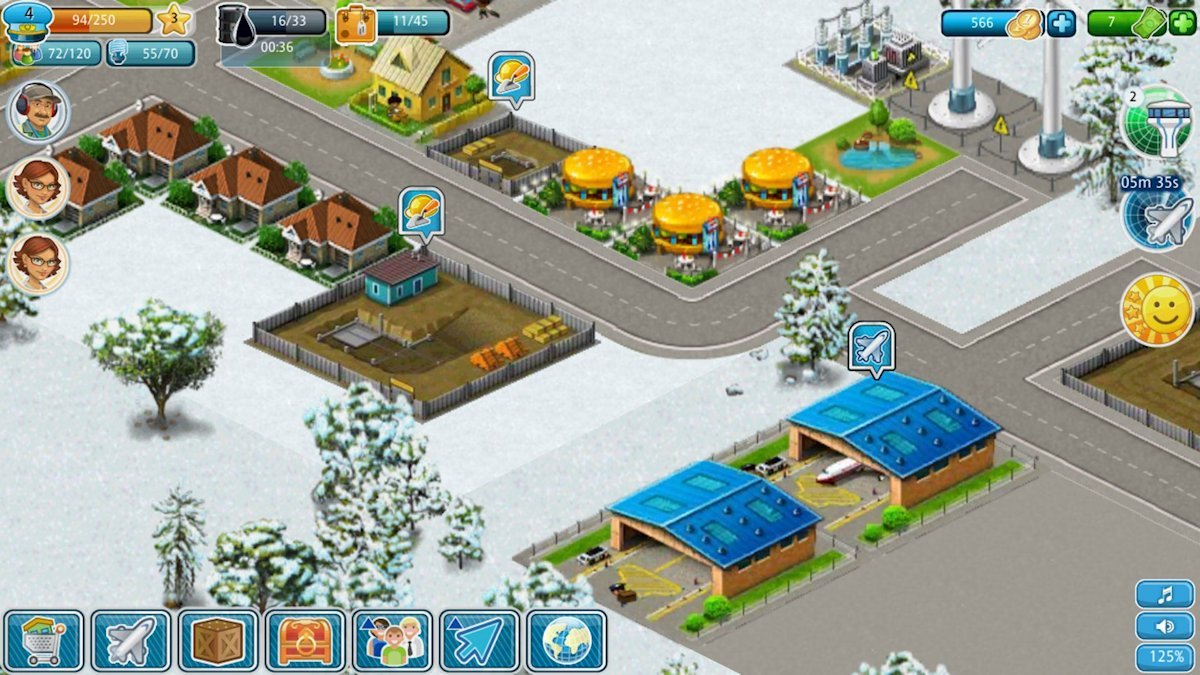
Each flight costs a certain amount of fuel and passengers. Players gain fuel over time – just like energy in other city builders. You’ll gain coins and experience when the plane comes back. As you repeat the same flight, you’ll increase that flight’s rank from zero all the way up to three stars. Each new rank provides a bonus such as free passengers.
Having selected a flight, it’s time to prepare the plane. Select the craft to fuel it, load it, and then send it into the sky. The plane will return a fixed period of time later, which varies by destination. Impatient players can opt to speed flights along by spending extra fuel.
Get the Windows Central Newsletter
All the latest news, reviews, and guides for Windows and Xbox diehards.
Later on, you’ll buy new planes and thus gave to build new runways. The more planes you send out, the more money your airport will earn. You’ll also receive occasional requests to land from visiting planes. As long as you have a free runway, they can land and add to your revenue. These visiting planes also have a chance of dropping valuable items.
Your airport also needs a repair base in order to keep planes from breaking down and a control tower to handle larger numbers of flights. After that, airport expansions consist of upgrades like better runways and even a few new ways to launch craft off the ground.
Growing airports need thriving cities
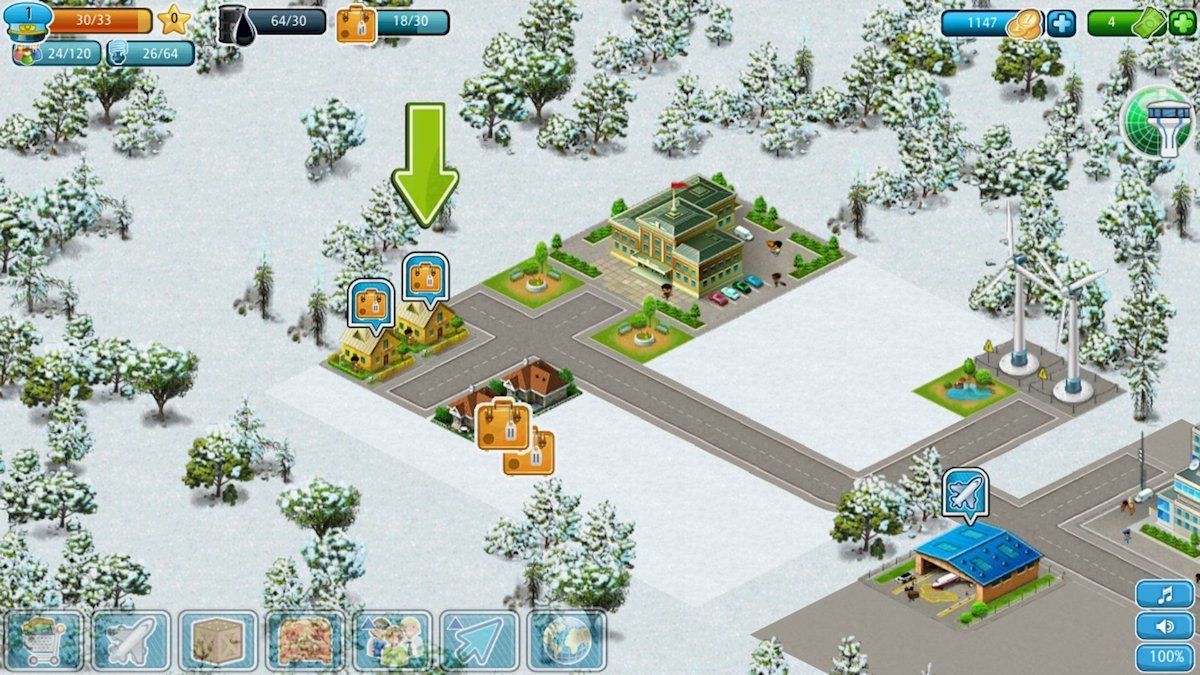
Airports in the middle of nowhere don’t tend to do all that well. Who’d want to go there, and where would the passengers come from? That’s exactly why players need to build up their cities in this game. Flights require passengers to run, and those passengers come from the surrounding city.
Residential buildings produce people (passengers) over time. Select a house with a suitcase over it in order to collect the passenger(s) it produces, much as in other city building games. If you find yourself constantly in need of more passengers, building new homes is a must.
New additions to your airport and city will cost money. Flights bring in some coins, but not enough to keep the whole city going. That’s where businesses like restaurants and stores come in. Each one produces coins over time, so you’ll want to balance out your residential expansions with commercial ones. All homes and businesses must be connected to roads, for better or worse.
Businesses and other buildings also require electricity to run, just as in the My Country games. As such, players will have to build power plants, turbines, and other power generators in order to keep up with their cities’ growing needs. The resource management is a lot to keep up with, although Airport City at least explains the various systems better than 2020: My Country does.
In-app Purchases
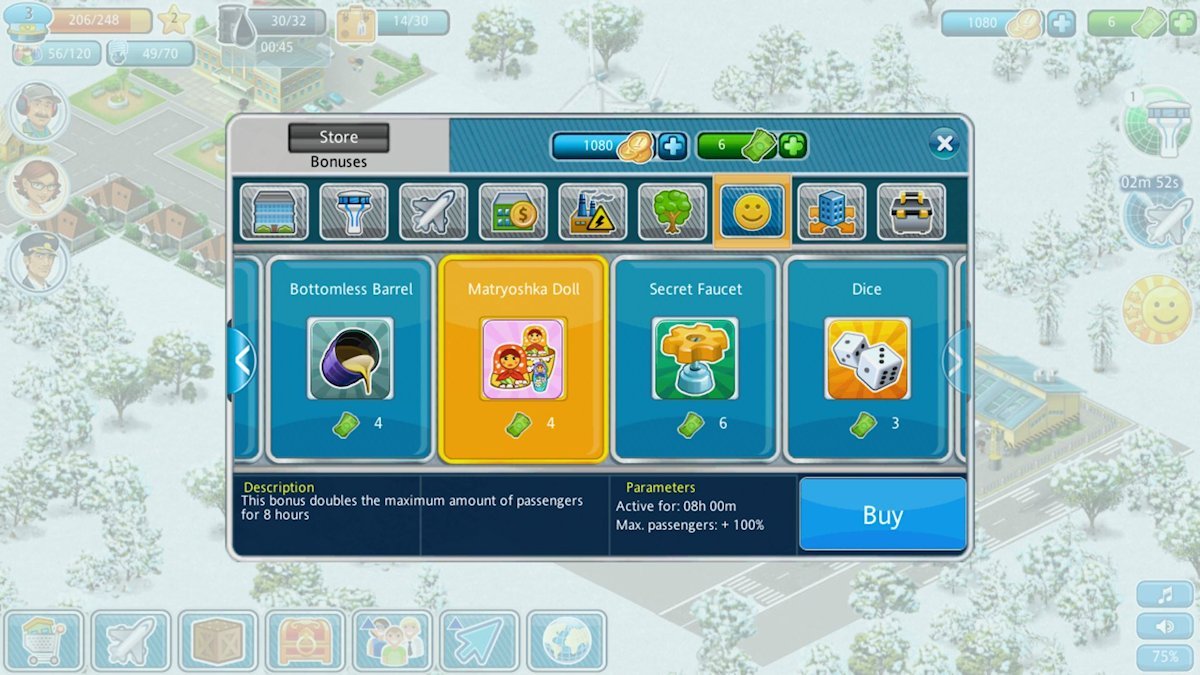
Casual city building games are all free to play, and that goes for Airport City too. The In-App Purchases consist of coins and Airport Cash. As mentioned earlier, coins can be earned through normal gameplay. Airport Cash is the hard currency that you have to pay for.
Some of the nicer buildings cost Airport Cash, but players can always purchase coin-equivalent buildings instead. The more compelling premium items are boosts that provide production bonuses like extra experience or fuel production for a set length of time. These can’t be bought with coins.
Social features
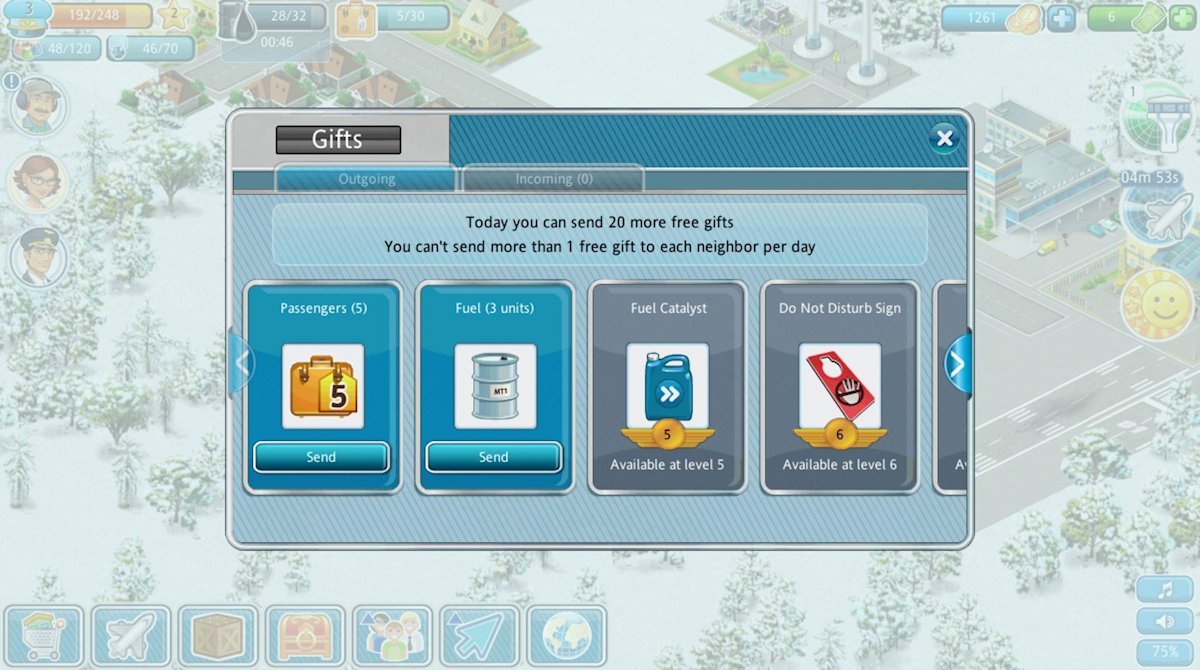
Airport City has some decent social features, though adding friends could be easier. There isn’t any Facebook connectivity that I can see – normally a standard feature in the genre. Instead, you have to add a friend’s unique code in order to visit him or her. Friend codes are just as un-intuitive here as they are on Nintendo consoles. Why not stick to usernames? My Windows Phone friend code is wj1bvm1 if you want to add me, anyway.
Once you have a friend or two on your list, you can visit their airports and interact with a few buildings. The number of buildings that can be interacted with per day is limited, as you might expect. Players can also send gifts to each other. You get to pick what type of gift you send – a huge improvement over the random crap we had to gift each other in 2020: My Country.
Ups and downs
Although Airport City looks to have a lot of content at launch, it also has a few problems. The artwork on both phone and tablet is kind of low resolution, for example. Zoom in and everything looks soft and grainy. The music also stinks, but that’s casual games for you. The Windows Phone game also has a habit of crashing when my Lumia 1520 goes into sleep mode. Not a big deal when I’m actively playing, but still a mild nuisance. I’m sure the crashes will be fixed with an update.
Since Airport City has launched on both Windows Phone 8 and Windows 8 and RT, it would be fantastic if players could hop back and forth between devices using the same save profile. Unfortunately, the game doesn’t support cloud saves. That’s always a concern with titles that expect us to play for long periods of time and maybe make purchases along the way. You’d lose anything you bought if you reinstalled the game or switched devices.
Thankfully, Game Insight is actually gearing up to integrate cloud saving into their games very soon. 2020: My Country will be the first title to get cloud saves; hopefully Airport City follows closely behind.
Airport City is another fine city building game for mobile Windows platforms. As usual, these games are not everybody’s cup of tea. You can never really win; just check in every day and watch your city grow over time. But that’s pretty fun, especially when you throw airplanes into the mix. Just don’t forget your photo ID if you want to make it through security!
- Airport City – Windows Phone 8 with 1GB of RAM or higher – 40 MB – Free – Store Link
- Airport City – Windows 8 and RT – 40 MB – Free – Store Link

Paul Acevedo is the Games Editor at Windows Central. A lifelong gamer, he has written about videogames for over 15 years and reviewed over 350 games for our site. Follow him on Twitter @PaulRAcevedo. Don’t hate. Appreciate!

